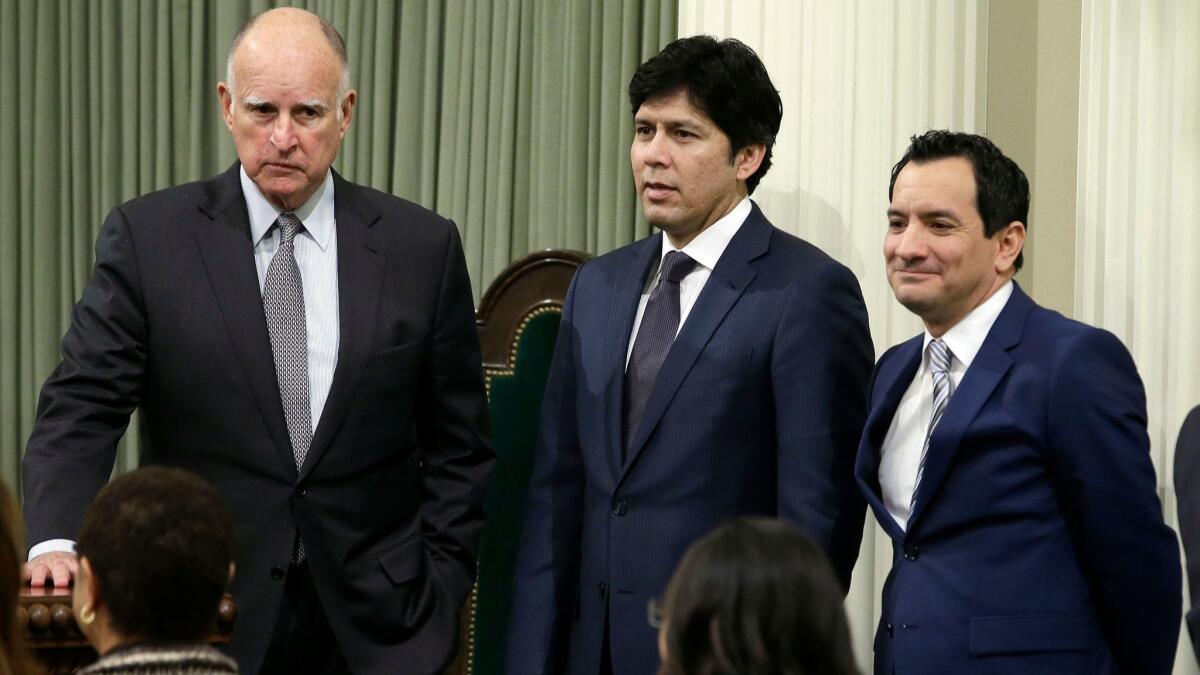Editorial: California’s legislature should use its supermajority power judiciously

- Share via
When Democratic state legislators return to Sacramento on Monday for the first day of the new two-year session, it will be in greater numbers than the previous session. Significantly greater.
With 55 members in the Assembly and 27 in the Senate, Democrats have reached the rare and almost-magical status of holding two thirds of the seats in each house. A super-supermajority, if you will. This confers more than bragging rights; with a two-thirds majority, Democrats can raise taxes, pass urgency measures that cannot be stalled by referendums, and move veto-proof bills without needing a single vote from their Republican colleagues. The ability to stop Democrats from passing tax increases is virtually the only power the minority party has wielded in state government since 2010, when voters eliminated the need for a two-thirds majority vote to pass a budget.
Democrats must avoid the temptation to pass vanity measures or bills that respond to the latest headlines.
The power conferred by the supermajority comes with great responsibility as well. Democrats must avoid the temptation to pass vanity measures or bills that respond to the latest headlines, craft sweetheart deals for special interests or launch irresponsible new spending programs that put unsustainable burdens on state government. Instead, they should concentrate on the big challenges facing California — the ones that Democrats complained they couldn’t address when they needed Republican votes to do so.
Democrats won a supermajority in both houses four years ago too, although they lost it quickly in the Senate — a member from the Central Valley quit to take a lucrative lobbying job and was replaced by a Republican — and later in the Assembly — after Republicans won seats in several closely divided districts. But demographics and political trends strongly suggest that the results in 2012 were no fluke. The steady increase in the number of registered California Democrats, and corresponding decrease in registered Republicans, made a Democratic supermajority all but inevitable. And that’s what happened in November.
Now, they ought to put it to good use. One priority should be transportation funding. It was disappointing, though not terribly surprising, that the Legislature failed to fix a severe funding gap in the state’s highway program during the special session that ended Wednesday. A new or added source of revenue is desperately needed, as fuel efficiency has dried up the flow of gas-tax dollars that have paid for roads, bridges and public transportation projects. Democratic legislative leaders blamed Republicans for this failure. Well, here’s their chance to raise gas taxes and fees to plug the gap and come up with a longer range plan to pay for roads.
Or is it? While the Republicans may have been rendered moot, at least in terms of blocking floor votes, there’s still the moderate Democrat caucus to contend with. The mod caucus is a group of Democratic legislators, mainly from poorer and/or agricultural districts in the Central Valley and Inland Empire, who are reluctant to support tax increases that would hit their constituents disproportionately. In 2015, this group successfully blocked the part of a climate change bill that would have required the use of petroleum to be cut in half by 2030. They can and should draw attention to the effects that their colleagues’ proposals would have on poor and working-class Californians. But ultimately they are still Democrats and share a common policy agenda — and that should include fixing the state’s crumbling transportation infrastructure.
This is also a prime opportunity to restructure the tax system. It’s due for an overhaul that reduces the volatility of state revenues while increasing simplicity and preserving progressivity in the tax code, so that the state doesn’t have to go begging for more money every few years just to keep the lights on. Perhaps there’s no stomach for big changes, such as applying sales taxes to services. But if not now, when? In any case, it is the right time for an examination of the state’s sales tax that Assemblywomen Lorena Gonzalez (D-San Diego) and Cristina Garcia (D-Bell Gardens) suggested after their bills to exempt diapers and tampons were vetoed by the governor. There are definitely inconsistencies in the sales tax, and this would be a worthy use of lawmakers’ time.
As would an affordable housing program and improvements in police transparency. In any case, Democrats, get to work immediately. Voters give, and they can take away. And if the Senate loses just one Democratic member to, say, a lucrative job at a lobbying firm, its newfound superpower is lost as well.
Follow the Opinion section on Twitter @latimesopinion and Facebook
More to Read
A cure for the common opinion
Get thought-provoking perspectives with our weekly newsletter.
You may occasionally receive promotional content from the Los Angeles Times.










